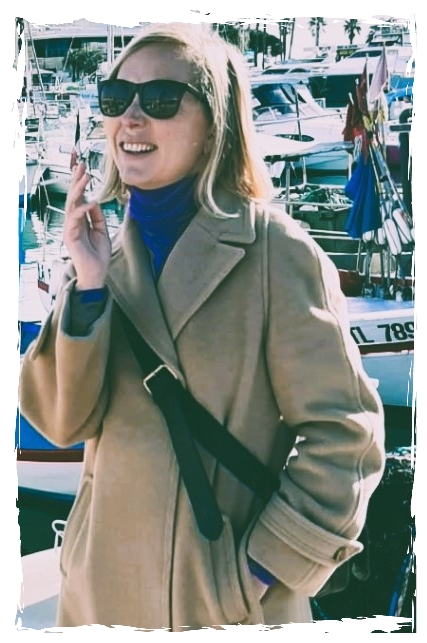A brief Q&A with author Ea Anderson
Read an excerpt from Ea’s novel, Crestfallen Around Noon, in the Summer 2022 issue of West Trade Review
Ea Anderson is originally from Denmark and a graduate of The Danish Academy of Creative Writing (forfatterskolen). After moving to Scotland, she started writing in English and completed a MSc in Creative Writing with distinction at the University of Edinburgh. Ea now writers primarily in English. She has published both poetry and prose in Danish literary magazines and is the author of Hun Bryder sig Langsomt om Hunde (She Slowly Cares for Dogs), published by the Danish publishing house Lindhardt & Ringhof (Athene). At the moment Ea lives in the south of France and is working on another novel.
WTR: How did your piece come to be and what do you want our readers/audience to know about your work?
Ea Anderson: This is my first novel. Previously I have focused on short stories and poetry. I knew I wanted to write a novel but it seemed like such an insurmountable task. And Crestfallen Around Noon did, in a way, start out as a short story with part of that story now part of the epilogue. Over months, I kept returning to that story but kept getting stuck, it just didn’t work. But I was really interested in this then-nameless woman, the protagonist. I tried popping in a husband, a boyfriend, a cat, to see if something would happen but I discovered the story seemed to be more about the women around the main character, and that what I wanted to know about her life, more than where she was going, was what was in her past, to see how she got here, standing alone crestfallen around noon (where the title comes from) in a square in a foreign country in the middle of siesta.
So, I started thinking about how this woman would react in different situations, and, to a certain degree, why she might do those things. She appeared as a little girl named June and characters started appearing around her and a storyline slowly took form. I wrote the novel from pillar to pillar, so to speak; I knew different things that would happen but not necessarily how or why. The how, how to get from pillar to pillar with the characters, that came as I wrote.
I always find it difficult to say what a book is really about. You can lay out the storyline but that won't actually tell you that much. I feel the answer really is in how a story is told, with a lot of it coming in the atmosphere of a book. But I have discovered that my writing often circles around the same themes. My main characters often feel alienated in the world, looking at the world and their own lives from the outside, more than directly participating. These themes and concerns are also found in my short story featured in West Trade Review’s Spring 2022 issue, “Accidental Days”. I think this approach can give a quirky, squinted feel to the writing, maybe even a bit uncanny sometimes. My characters also often struggle with taking themselves seriously as adults and often have some sort of nature/culture battle inside them, which is reflected in how they see the world and ultimately what the book looks like.
WTR: What was the last book, story, poem, work of art that moved you?
EA: I have read so many amazing books recently, but what pops into my head is a print of a photo taken by Henri Cartier-Bresson that my husband gave me for my birthday. “Behind The Gare St. Lazare” it’s called. I won’t say it moved me but it made me curious. In general, I have a fondness for strange photos. I have another one in my writing room that I bought at a flea market years and years ago. The photo shows an empty hair salon and is probably taken in the 1950s. All these empty hair hood dryers, chairs and basins, and mirrors that don't reflect anybody. There’s a window in the salon and you can see it’s dark outside and a clock shows the time as 1.15. And I imagine this photographer alone in the salon in the middle of the night.
WTR: Anything you’d like to say to our readers/audience?
EA: Yes, I would like to say thank you for reading, in general and in this case my piece. I still feel a kind of writer’s imposter syndrome and always feel grateful when somebody shows interest in my work. Also, I hope you enjoyed reading the piece and that it gave you something. Thank you.
__________________________________________________________________________________________________________________________________________________________________________
__________________________________________________________________________________________________________________________________________________________________________
__________________________________________________________________________________________________________________________________________________________________________
__________________________________________________________________________________________________________________________________________________________________________
__________________________________________________________________________________________________________________________________________________________________________
©2022 West Trade Review
Stay Connected to Our Literary Community. Subscribe to Our Newsletter



